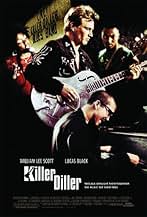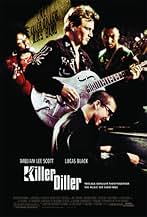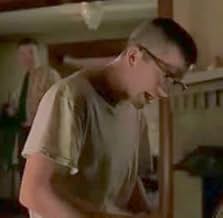Adicionar um enredo no seu idiomaA guitar playing car thief meets an autistic savant piano player, and together they transform a group of reluctant halfway house convicts into The Killer Diller Blues Band.A guitar playing car thief meets an autistic savant piano player, and together they transform a group of reluctant halfway house convicts into The Killer Diller Blues Band.A guitar playing car thief meets an autistic savant piano player, and together they transform a group of reluctant halfway house convicts into The Killer Diller Blues Band.
- Prêmios
- 1 vitória no total
- Direção
- Roteiristas
- Elenco e equipe completos
- Produção, bilheteria e muito mais no IMDbPro
Enredo
Você sabia?
- CuriosidadesThe cast and crew stayed together at one hotel in Columbia, Missouri. They would shoot all day, then bring the instruments back to the hotel club, and play music together at night.
Avaliação em destaque
First and foremost this film is about the blues and the story of a juvenile
delinquent stuck in a baptist halfway-house who must play in a sappy christian band with fellow halfway-house delinquents when they really just want to play the blues. In this respect, the film was interesting and relatively well made. The story arc was laid out plain and predictable, but still enjoyable enough.
My criticism of the film comes when the film's autistic character Verne enters the story as a piano prodigy with an affinity for driving an invisible fantasy car. To me, this portrayal of autism is marred by typical on-screen half-truths that breed ignorance in understanding this unfortunate disorder. I will state plainly,
however, that I am certainly not an expert in defining autism, nor do I know any autistic people. However, it is clear to see that Killer Diller was not accurate. They started with trueish conceptions of autism: that those who have it have
communication disorders, preoccupation with fantasy, repetitive acts and
attachment to objects.
However, Verne, the autistic character in this film, was more less portrayed as a late-teens autistic child who has apparently never received significant treatment for his condition and thus he is basically just a socially awkward kid who drives an invisible car, shakes all the time, has to pee all the time, and goes beserker when anyone questions his "rocking." But in the end, with just a little bit of socializing and positive feedback about his piano skills, Verne is another autism success story, able to at once overcome what would have been severe speech
impediments, years of social disfunction and other problems all without
treatment, therapy or any real help.
The problem with this is that it looks like the film makers just watched Rainman and watered down the formula. All autistic children, of course, will overcome their most severe problems sometime in adulthood through random coincidence
and socialization. Afterall, their speech impediments are never really all that limiting, really just idiosyncrasies to be overcome with a few laughs. But this is resonable since all autistic people are really just idiot savants in hiding.
Rainman is a counting genius and Verne from Killer Diller is a piano prodigy.
This, to me, is dangerous, the concept of always simplifying disorders into cute, manageable characters who can overcome their "hang-ups" in 90 mins or two
hours. I'm not saying either cases are inconceivable, but the sad truth is that the communication problems caused by autism are typically overcome after
considerable work with a doctor, etc. from EARLY childhood. Verne, especially, is a case that in which the character is supposedly not treated or not thoroughly treated at all and can suddenly overcome speech impediment once he accepts
his surrounding social situation. He really has no vocabulary or pronounciation problems, just a little stumbles here and there, a few quirky repeats, a few off- kilter statements, a few simplistic, childish speeches. I think that if Verne was real, he would unfortunately never be able to carry on a conversation with
typical language. His chances of being a piano prodigy wouldn't be too
excellent....okay, you get the idea.
One last criticism: the acting of Verne in this film was not very strong. I realize this was a low budget feature with no real "name" actors attached, etc. However, Dustin Hoffman is an accomplished actor who takes his character studies to the limit. His taste for reseach and observation/immitation almost always brings
believability-- at least a considerable degree--to his roles, Rainman being no exception. In this case, the actor to play Verne seemingly went to little more trouble then to take cues from the director just before the take. "Ok, actors ready. Verne, umm...., rock back and forth....and act like you need to go to the
bathroom. Okay? Okay. Roll Sound. Roll Camera."
And so on... anyway, I honestly don't know how much research went into the
role of Verne, and it very well may have been treated with care. But I honestly didn't get that impression. Verne's place in the film ranged from comic relief to agency for change for the main character to superficial change into a sociable, well-adjusted guy. I just didn't think he was treated with respect. The only
mention/serious handling of his condition was with a doctor of sorts who spoke on his autism only in passing. If you wanted to leave this film as is, why not just cut that scene and claim that Verne is just a kooky, weird guy instead of a
character with autism, a guy who would have been dealing with a serious
condition all of his life and probably wouldn't have come out so socially apt.
delinquent stuck in a baptist halfway-house who must play in a sappy christian band with fellow halfway-house delinquents when they really just want to play the blues. In this respect, the film was interesting and relatively well made. The story arc was laid out plain and predictable, but still enjoyable enough.
My criticism of the film comes when the film's autistic character Verne enters the story as a piano prodigy with an affinity for driving an invisible fantasy car. To me, this portrayal of autism is marred by typical on-screen half-truths that breed ignorance in understanding this unfortunate disorder. I will state plainly,
however, that I am certainly not an expert in defining autism, nor do I know any autistic people. However, it is clear to see that Killer Diller was not accurate. They started with trueish conceptions of autism: that those who have it have
communication disorders, preoccupation with fantasy, repetitive acts and
attachment to objects.
However, Verne, the autistic character in this film, was more less portrayed as a late-teens autistic child who has apparently never received significant treatment for his condition and thus he is basically just a socially awkward kid who drives an invisible car, shakes all the time, has to pee all the time, and goes beserker when anyone questions his "rocking." But in the end, with just a little bit of socializing and positive feedback about his piano skills, Verne is another autism success story, able to at once overcome what would have been severe speech
impediments, years of social disfunction and other problems all without
treatment, therapy or any real help.
The problem with this is that it looks like the film makers just watched Rainman and watered down the formula. All autistic children, of course, will overcome their most severe problems sometime in adulthood through random coincidence
and socialization. Afterall, their speech impediments are never really all that limiting, really just idiosyncrasies to be overcome with a few laughs. But this is resonable since all autistic people are really just idiot savants in hiding.
Rainman is a counting genius and Verne from Killer Diller is a piano prodigy.
This, to me, is dangerous, the concept of always simplifying disorders into cute, manageable characters who can overcome their "hang-ups" in 90 mins or two
hours. I'm not saying either cases are inconceivable, but the sad truth is that the communication problems caused by autism are typically overcome after
considerable work with a doctor, etc. from EARLY childhood. Verne, especially, is a case that in which the character is supposedly not treated or not thoroughly treated at all and can suddenly overcome speech impediment once he accepts
his surrounding social situation. He really has no vocabulary or pronounciation problems, just a little stumbles here and there, a few quirky repeats, a few off- kilter statements, a few simplistic, childish speeches. I think that if Verne was real, he would unfortunately never be able to carry on a conversation with
typical language. His chances of being a piano prodigy wouldn't be too
excellent....okay, you get the idea.
One last criticism: the acting of Verne in this film was not very strong. I realize this was a low budget feature with no real "name" actors attached, etc. However, Dustin Hoffman is an accomplished actor who takes his character studies to the limit. His taste for reseach and observation/immitation almost always brings
believability-- at least a considerable degree--to his roles, Rainman being no exception. In this case, the actor to play Verne seemingly went to little more trouble then to take cues from the director just before the take. "Ok, actors ready. Verne, umm...., rock back and forth....and act like you need to go to the
bathroom. Okay? Okay. Roll Sound. Roll Camera."
And so on... anyway, I honestly don't know how much research went into the
role of Verne, and it very well may have been treated with care. But I honestly didn't get that impression. Verne's place in the film ranged from comic relief to agency for change for the main character to superficial change into a sociable, well-adjusted guy. I just didn't think he was treated with respect. The only
mention/serious handling of his condition was with a doctor of sorts who spoke on his autism only in passing. If you wanted to leave this film as is, why not just cut that scene and claim that Verne is just a kooky, weird guy instead of a
character with autism, a guy who would have been dealing with a serious
condition all of his life and probably wouldn't have come out so socially apt.
- Aerocitizen
- 21 de mar. de 2004
- Link permanente
Principais escolhas
Faça login para avaliar e ver a lista de recomendações personalizadas
Detalhes
Bilheteria
- Orçamento
- US$ 2.000.000 (estimativa)
- Faturamento bruto nos EUA e Canadá
- US$ 20.795
- Fim de semana de estreia nos EUA e Canadá
- US$ 17.346
- 30 de abr. de 2006
- Faturamento bruto mundial
- US$ 20.795
- Tempo de duração1 hora 35 minutos
- Cor
Contribua para esta página
Sugerir uma alteração ou adicionar conteúdo ausente

Principal brecha
By what name was Killer Diller (2004) officially released in India in English?
Responda































